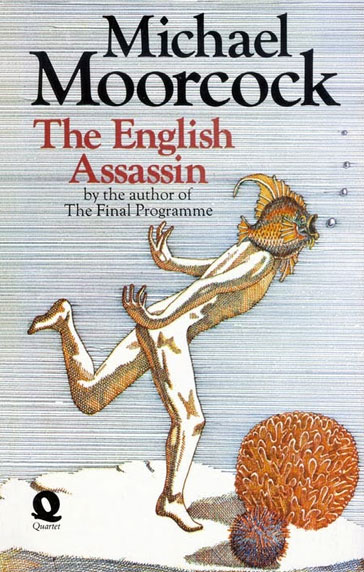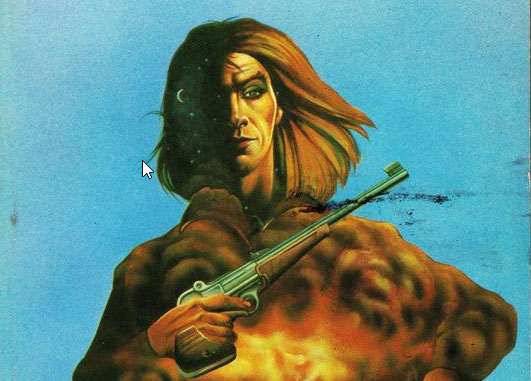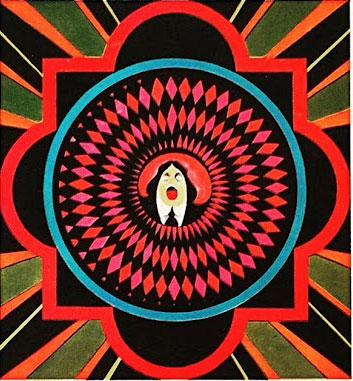You that never done nothin’
But build to destroy
You play with my world
Like it’s your little toy
You put a gun in my hand
And you hide from my eyes
– Bob Dylan, ‘Masters of War’
Looking back now
I can see
the ghost of myself
haunting me
– Pet Shop Boys, ‘The Ghost of Myself


What We Know On Day One
Once upon a time, there was a polysexual hippy assassin named Jerry Cornelius. He had a past filled with adventure and danger, and often found himself in precarious situations. One day, Jerry decided to take a break from his life and explore the world. He travelled to different countries and encountered different cultures. Everywhere he went, he made a lasting impression with his unique sense of style and his individual way of life. Jerry eventually settled down in a small town and started living peacefully. He still had his moments of adventure, but he mostly led a balanced lifestyle. He spent his days working, and his nights exploring the town and meeting new people, and was involved in dozens of organisations: a running club, community gardening and a public speaking group for women.
The Splashback Scandal
It is a model of belligerent fascism and land-grabbing tyranny, with ambiguous reverence for men’s bodies. Jerry is kept in a tiny cage, she has no food or water but, in this stylised and theatricalised episode, this is not as important as the idea of imprisonment.
Later, a resourceful guard uses a salvaged bit of wire to saw through her neck. The sheriff’s department will not say how or where the body was found. The violence is the latest to rock community leaders. Following the incident, Jerry says she managed to get away but was followed into the clubhouse by the owners of a dog, who she claims was filming her.
Over-prioritise and you’ll find yourself at yet another detention centre from which you will emerge broken, holes in the knees of your trousers and a chunk of your self-respect forever lost somewhere in the ball pit. Jerry says she is especially concerned about her mental wellbeing.
What We Know On Day Fifty Seven
It feels as if events and encounters could be reshuffled and shown in any order. Every gesture is beautifully expressive, rich with emotion but is just going to make things worse because it will cement in place an agreement that has destroyed power sharing. The only choices that Jerry is allowed to make are meaningless.
Disco Boy: a freaky trip into the heart of darkness
The electronic score throbs in its own incantatory trance and is a thing of beauty. It’s quite a trip, manipulating the space-time continuum and travelling through time to control the universe. Live, the band are something like a hallucinatory nervous breakdown, playing music which gains its own kind of mysterious reality simply by being excessively loud. There is a sense of confrontational spectacle and narcosis, and soon everyone is having sex: rough, dangerous, obsessive sex. Everyone is overwhelmed with guilt but ecstatically infected with confrontational spectacle and narcosis. Jerry may be choosing the person who will be at his side for the duration of all time. I don’t know if he’ll be able to get out.
What We Know On Day Eighty Four
Once upon a time, there was a musical assassin named Jerry Cornelius. She was a spy with the power to travel through time and control the universe with music. She began her journey by exploring different periods of history, eventually mastering the art of using her powers to protect those who could not protect themselves from dangerous events.
Jerry eventually grew older and started to reflect on her life. She realized that she had made many friends along the way, and that they had all helped her to become the person she was today, a charismatic guerrilla fighter who with her sister leads an insurgent paramilitary group. But there were limits to what she could do during the war.
In The Ruins
Everywhere there is great economic unease and generational trauma, mysterious political and historical dimensions. The past is a time-capsule of Europe’s recent tragic past, documenting post-apocalyptic illness, a state of bewilderment and discombobulation.
Someday we’ll kiss the future and tell each other everything.

© Rupert M Loydell
